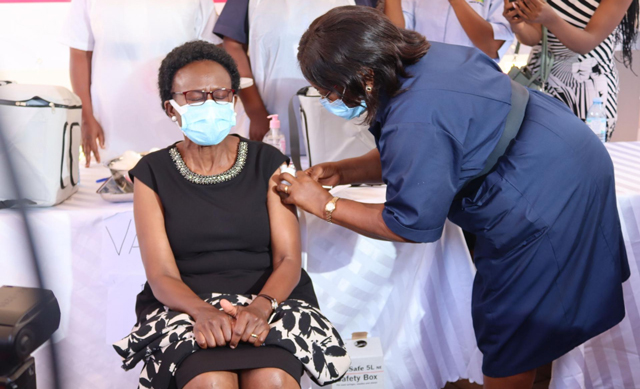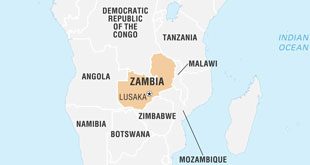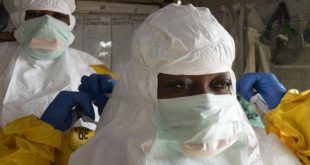
Kampala, Uganda | THE INDEPENDENT | The ministry of health has been forced to continuously revise the COVID-19 vaccination priority groups due to the low uptake of the vaccine.
According to health ministry officials, they have been forced to change the original plan of vaccination to increase uptake of the vaccine. Originally, vaccination was supposed to start with health workers, teachers, security personnel, persons living with co-morbidities and those aged 50 and above.
With only 964,000 vaccines received so far, the health ministry had prior to the start of Vaccination decided to focus on vaccinating 150,000 health workers and 550,000 teachers from different education institutions. The reminding 260,000 doses were supposed to be given to security personnel and some people with co-morbidities. The remaining priority groups were supposed to get the vaccines in May when the next consignment of over 1.5 million vaccines is expected.
As of yesterday, only 227,691 people have been vaccinated against COVID-19 since vaccination began last month. This is lower than was expected.
Due to such low uptake of the vaccine, changes have had to be made to the vaccination programme. Since vaccination began, groups such as Members of Parliament with their partners and staff plus Uganda National Examinations staff have been vaccinated. In addition to these, staff of banks including Bank of Uganda have also been added to the list. While this might raise eyebrows, ministry officials say they had no other option.
Dr Alfred Driwale, the head of the Uganda National Expanded Programme on Immunization says they have had no other option but to make continuous changes to their original programme.
He says changes were made to ensure that vaccines are utilised so that the country can get more doses.
” The uptake is not good and it is delaying our next consignment which will be informed by how well we are absorbing what we have. We shall only get more vaccines if we prove that we can consume what we have. To do that, we have decided to open up vaccination so that the stocks can be used quickly and we get our next consignment,” Dr Driwale said.
According to Dr Driwale, by June 2020 Uganda is expected to have received another 2.6 million doses through the COVAX facility. However, this can only happen if the 846,000 doses that were received in March are used up.
However, a source from the health ministry who preferred to remain anonymous says there’s a lot of lobbying taking place for people to receive vaccines.
” Here at the back door there is a lot of lobbying taking place for the vaccines,” the source said. “Companies are always at the ministry and even KCCA offices asking to be given the vaccine. It’s no longer about who needs the vaccine but rather about who wants it urgently.”
Right now, vaccination has been opened up to persons aged 18 and above with comorbidities and persons aged 50 and above. Dilwale says they will likely open up the campaign to another group. He however does not reveal which group.
When asked whether such changes might defeat the purpose of prioritising some groups on the basis of the high risk they face of being infected with the disease, Dr Driwale said it might but there is little they can do.
” It is sad but we do not know what else we can do,” Driwale said. “If the targeted priority groups had accepted the vaccine, we would not have any more vaccines available at the moment. We thought by the second week of April, we would not have any more vaccines. But they have not and we now have to find a way of using up the vaccines.”
Dilwale attributes the low uptake of the vaccine to suspicion and misinformation purported by anti-vaxxers who claim the vaccines alter a recipients DNA. However, reports published by the European Medicines Agency that show the vaccine has been linked to causing rare blood clots in people have heightened the situation.
James Serugo, the assistant governor of Rotary District 9211 and also the person in charge of a Rotary campaign to raise awareness on COVID-19 vaccination attributes the low uptake of the vaccine to poor public sensitisation by the government.
Serugo who is in charge of a Rotary campaign aimed at popularizing the COVID-19 vaccine among Rotary members and in communities, says they were forced to take up the campaign to raise awareness about the safety of the vaccine. As part of the campaign, persons who have been vaccinated are encouraged to take a picture and post it on social media sites as a means of raising awareness.
” We did this to raise awareness after seeing almost no public sensitisation from the health ministry,” Serugo said. “There are no announcements on TV or even on radios. Since Rotary is everywhere, we decided to get involved. But we think the health ministry needs to increase awareness. People do not have enough information about the vaccine. On radios and TV, hardly any information is shared.”
The minister of health, Dr Jane Ruth Aceng last week told URN that an attitude change is a solution to increasing uptake of the vaccine. She says parents need to get used to the idea that vaccination is not only for children as is the norm but can also apply to adults as is the case in this scenario.
Currently, the country is still under partial lockdown with nursery schools and entertainment places such as bars, discotheques and theatres still not allowed to operate. The national curfew that starts at 9:00 pm until5:30 am is still in effect. According to President Yoweri Museveni, these measures and others will continue until at least 5 million elderly people and those who suffer from comorbidities have been vaccinated.
However, with the low uptake of the vaccines at the moment, and an increasing number of COVID-19 cases, some scientists predict that the country will likely go back to a semblance of normal in 2022.
*******
URN
 The Independent Uganda: You get the Truth we Pay the Price
The Independent Uganda: You get the Truth we Pay the Price


